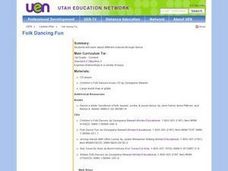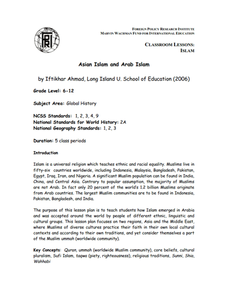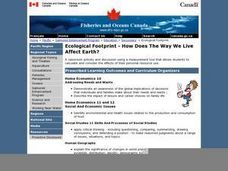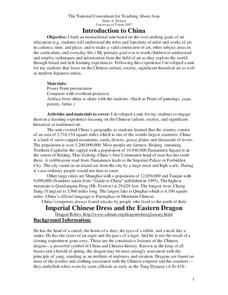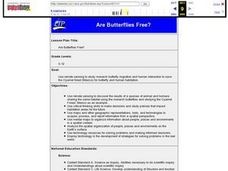Curated OER
America, A Home for Every Culture
Students investigate the many cultures that are represented in America. In this American culture lesson, students look at the food, languages, music, and traditions that immigrants have contributed to the face of America. They complete...
Curated OER
The Wrath of Hurricane Mitch
Young scholars investigate how hurricanes and other natural disasters can devastate the elements of the infrastructure of a country, as well as the lives of its people.
Curated OER
Pandemic Flu
Young scholars review the difference between viruses and bacteria, and provide examples of illnesses that each can cause. To help students comprehend how quickly an influenza infection can spread, they perform an activity. They are...
Curated OER
Folk Dancing Fun
First graders discuss different kinds of music they have heard. They listen to a short selection of folk music and discuss where they think it is from. Using a globe, the teacher shows students where the music is from. They spread out on...
Curated OER
Comparing Countries
Young scholars compare facts about different countries. In this comparing lesson, students collect information about the US and another country and compare them. Young scholars locate countries on the map and make a hypothesis about the...
Foreign Policy Research Institute
Asian Islam and Arab Islam
Focus on the impact and practice of Islam throughout Asia and the Middle East. Learners review the seven major religions, the spread of Islam, and Islamic tenets commonly practiced. They then research one country that practices Islamic...
Curated OER
Who's The Boss?
Upper elementary and middle schoolers research and analyze some different types of governments. Democracies, Monarchies, and Dictatorships are some of the types that are looked at. Learners use the Internet to gather information that...
Curated OER
Examining What Sharing Really Means
Learners read "The Senegalese Miracle". They discuss the amount of sharing the author finds in Africa. They examine the relationship the author has to the locals.
Curated OER
Ecological Footprint--How Does The Way We Live Affect Earth?
Young scholars demonstrate an awareness of the global implications of decisions that individuals and families make about their needs and wants. They identify environmental and health issues related to the production and consumption of...
Curated OER
Introduction to China
Compare and contrast the distinctive characteristics of art forms from various cultural, historical, and social contexts, and describe how the same subject matter is represented differently in works of art across cultures and time...
Curated OER
"The Drum"
Second graders read and discuss the folktale "The Drum" from India. They also answer story comprehension questions, complete an adjectives and verb worksheet, and label a map of India. Students sequence events from the story and make...
Curated OER
Are Butterflies Free?
Students use remote sensing to study monarch butterfly migration and human interaction to save the Oyamel forest (Mexico) for butterfly and human habitation.
Curated OER
The Carlyle House and Gadsby Tavern
Fourth graders tour the Carlyle House and Gadsby Tavern while working on worksheets covering both places. They are to write an essay and thank you notes to finish the lesson.
Curated OER
America the Beautiful
Students listen to a read-aloud discussing the landmarks of the United States. In pairs, they use the internet to research a landmark of their choice. They create a visual aid to be given with a presentation sharing the information...
Curated OER
Human Migration in the United States
Students investigate the factors involved in human migration in the United States. Students analyze maps of different regions in the United States to determine how a variety of factors influence human settlement and development.
Curated OER
Central America and the Caribbean Culture Travel Brochure
Ninth graders take a trip to Central American and the Caribbean. In this culture and geography instructional activity, 9th graders research selected countries of the region. Students use their findings to create...
Curated OER
Gray Whales on the Move
Learners study whale migration and their natural history. In this migration lesson students plot whale migration on a map and describe their ecosystems.
Curated OER
Cultural Diversity In The Classroom
Learners engage in a lesson that supports the fact that Asian people are part of the educational culture in schools. The lesson includes background information for the teacher. With the completion of the unit students develop a personal...
Curated OER
Discovering Your Community
Learners focus on the origins of the families that make up their community by exploring their family's origins through themselves, parents, and grandparents. Students create a map marked with family origins for the class.
Curated OER
The Commonwealth - people and places
Students study the commonwealth as an example of a global community. The study what the Commonwealth is, its values, and its function and they reflect upon personal connections with the Commonwealth. After they investigate their own...
Curated OER
Lesson Design Archaeology- U.S. Map
Students examine the U.S. map and identify cultural areas. In this archaeology lesson, students locate cultural areas on the U.S. map and fill in the proper locations.
Curated OER
You Need How Much Food When? Where?
Ninth graders explore how human activities shape the earth's surface. In this awareness lesson, 9th graders create pictographs showing the relations of food, people, land, and resources. Students complete worksheet.
Curated OER
Solid Waste and Our Natural Resources: Utilizing the Story THE LORAX
Students gain an introduction to our planet's solid waste problem and our personal responsibility in curbing and solving said problem through the use of Dr. Seuss' book, The Lorax. After hearing the book, class discussion follows.
Curated OER
Hello Mexico City
Students research and explain the functions, characteristics, and cultural aspects of Mexico City and analyze how they have affected development and settlement. Students work in groups to gather information and report back to the class.





